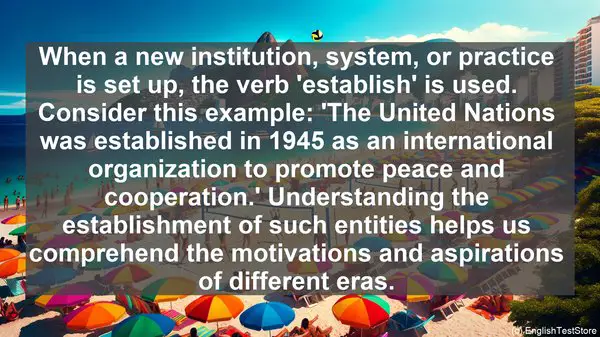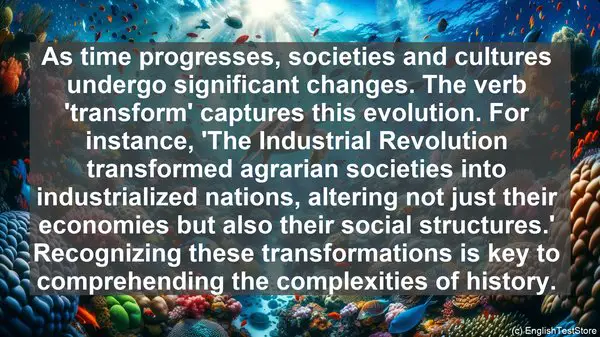Introduction: The Importance of Verbs in Historical Discussions
When it comes to discussing historical events and periods, verbs play a crucial role. They not only convey actions but also provide context, timelines, and connections between different events. In this lesson, we’ll explore the top 10 verbs that are frequently used in historical discussions.

1. Influence: How One Event Shapes Another
The verb ‘influence’ is often used to describe how one historical event or period affects another. For example, ‘The Renaissance greatly influenced the Enlightenment, leading to a surge in scientific discoveries and philosophical ideas.’ Understanding these influences helps us grasp the interconnectedness of different historical eras.
2. Transform: The Evolution of Societies and Cultures
As time progresses, societies and cultures undergo significant changes. The verb ‘transform’ captures this evolution. For instance, ‘The Industrial Revolution transformed agrarian societies into industrialized nations, altering not just their economies but also their social structures.’ Recognizing these transformations is key to comprehending the complexities of history.
3. Emerge: The Birth or Rise of Something
When a new idea, movement, or entity comes into existence, we use the verb ’emerge.’ Consider this example: ‘The Civil Rights Movement emerged in the 1950s as a response to systemic racial discrimination, eventually leading to landmark legislation.’ Studying such emergences sheds light on the struggles and triumphs of different communities.
4. Conquer: The Expansion of Empires and Territories
Throughout history, empires have risen and fallen. The verb ‘conquer’ signifies the acquisition of new territories. For instance, ‘Alexander the Great conquered vast regions, establishing one of the largest empires in ancient times.’ Understanding conquests helps us understand power dynamics and geopolitical shifts.
5. Revolt: Challenging the Status Quo
When people rise against an oppressive system or regime, the verb ‘revolt’ is used. Consider this example: ‘The French Revolution was a result of the common people revolting against the monarchy and demanding equality.’ Revolts often mark significant turning points in history.
6. Colonize: Expanding Beyond Borders
The verb ‘colonize’ refers to the establishment of colonies in foreign lands. For example, ‘European powers colonized various parts of Africa and Asia during the Age of Exploration.’ The consequences of colonization, both positive and negative, continue to shape our world today.
7. Preserve: Retaining Historical Artifacts and Knowledge
Preservation is crucial for maintaining our historical heritage. The verb ‘preserve’ is used to describe actions taken to safeguard artifacts, documents, or traditions. For instance, ‘The library at Alexandria was built to preserve and disseminate knowledge from different civilizations.’ Preserving our past ensures its availability for future generations.
8. Document: Recording Historical Information
The verb ‘document’ signifies the act of recording historical information. From ancient hieroglyphics to modern digital archives, documentation has evolved over time. ‘The Domesday Book, commissioned by William the Conqueror, documented the landholdings and resources of England in the 11th century.’ These documents provide invaluable insights into the past.
9. Establish: Creating Institutions and Systems
When a new institution, system, or practice is set up, the verb ‘establish’ is used. Consider this example: ‘The United Nations was established in 1945 as an international organization to promote peace and cooperation.’ Understanding the establishment of such entities helps us comprehend the motivations and aspirations of different eras.

10. Reflect: Analyzing the Significance of Events
The verb ‘reflect’ is often used when analyzing historical events and their implications. For example, ‘The fall of the Berlin Wall reflected not just the end of the Cold War but also the triumph of democracy and the desire for freedom.’ Reflecting on events helps us draw lessons and understand their broader impact.
